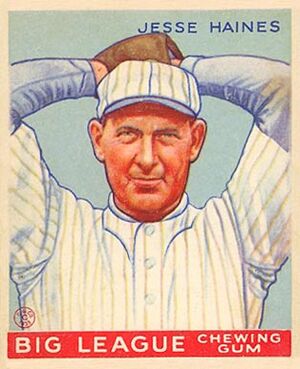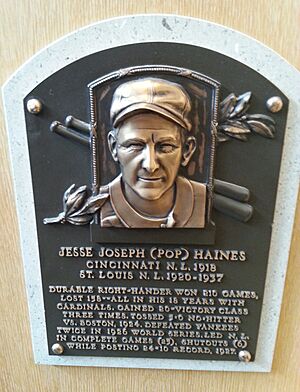Jesse Haines facts for kids
Quick facts for kids Jesse Haines |
|||
|---|---|---|---|
 |
|||
| Pitcher | |||
| Born: July 22, 1893 Clayton, Ohio, U.S. |
|||
| Died: August 5, 1978 (aged 85) Dayton, Ohio, U.S. |
|||
|
|||
| debut | |||
| July 20, 1918, for the Cincinnati Reds | |||
| Last appearance | |||
| September 10, 1937, for the St. Louis Cardinals | |||
| MLB statistics | |||
| Win–loss record | 210–158 | ||
| Earned run average | 3.64 | ||
| Strikeouts | 981 | ||
| Teams | |||
|
|||
| Career highlights and awards | |||
|
|||
| Induction | 1970 | ||
| Election Method | Veterans Committee | ||
Jesse Joseph Haines (born July 22, 1893 – died August 5, 1978) was an American baseball player. People called him "Pop". He was a pitcher in Major League Baseball (MLB). He played for the Cincinnati Reds and the St. Louis Cardinals.
Jesse Haines played in the minor leagues for a long time. He then played briefly in MLB in 1918. After that, he played from 1920 to 1937. He spent almost his whole MLB career with the St. Louis Cardinals. Haines helped his teams win three World Series championships. Even though he was a kind person off the field, he was a very strong competitor during games.
After he stopped playing in 1937, Haines became a coach. He coached for the Brooklyn Dodgers in 1938. He then left baseball and went back to his home in Ohio. In 1970, he was chosen for the Baseball Hall of Fame. In 2014, he was also added to the St. Louis Cardinals Hall of Fame Museum. He is second in Cardinals history for the most shutout games.
Contents
Early Life and Baseball Beginnings
Jesse Haines was born in Clayton, Ohio. He grew up in a nearby town called Phillipsburg. He went to school there. His father, Elias, worked as an auctioneer.
Jesse loved baseball and wanted to play for his local team. His parents did not want him to play on Sundays. So, Jesse would sneak out. He would hide his uniform in a corn crib and change clothes in a cornfield. In 1912, he left town to play semi-pro baseball in Dayton. Soon after, he signed to play for a minor league team in Dayton.
Playing in the Minor Leagues
Haines spent several years playing in minor league baseball. He pitched for teams in many cities. These included Saginaw, Fort Wayne, Springfield, Topeka, and Tulsa. He played a short time in the major leagues with the Cincinnati Reds in 1918. But he soon went back to the minor leagues. During his time in the minor leagues, he had a record of 107 wins and 61 losses. His earned run average (ERA) was 1.93 over 187 games.
Branch Rickey worked for the St. Louis Cardinals. He saw Haines pitch in Kansas City. The Cardinals team did not have much money then. But Rickey convinced some team owners to borrow $10,000. This money was used to buy Haines's contract.
While playing in the minor leagues, Jesse Haines married Carrie M. Weidner. They had one child together.
Jesse Haines's Major League Career
Jesse Haines became a regular pitcher for the Cardinals in 1920. He pitched 3012⁄3 innings that year. This was the most innings he ever pitched in one season. He had a 13–20 record, but his earned run average (ERA) was a good 2.98.
People said that Haines was a calm person normally. But he hated to lose games. When he was pitching, he became very intense.
No-Hitter and World Series Wins
Haines pitched a no-hitter game on July 17, 1924. This means no player on the other team got a hit. He did this against the Boston Braves. It was more than 50 years before another Cardinals pitcher threw a no-hitter at home.
Haines played on three teams that won the World Series. He won two games in the 1926 World Series. In the seventh game of that series, Haines got a bleeding blister on his hand. He had to leave the game. The bases were loaded with opposing players. Grover Cleveland Alexander came in to pitch. He struck out Tony Lazzeri to save the game.
Later Career and Nickname
As Haines got older, he became known as "Pop." This was because he helped and influenced younger players on the team. He learned to throw a special pitch called a knuckleball. This pitch helped him keep playing even when his other pitches were not as good. Most knuckleball pitchers hold the ball with their fingertips. But Haines actually held the ball with his knuckles. He would throw it as hard as he could.
Haines started pitching fewer games in 1932. By 1936, the team manager, Frankie Frisch, thought Haines was too old. He kept him out of games until May. But the Cardinals' other pitchers got injured. So, Haines got more chances to play that year. In June, he even pitched in relief for three days in a row.
He stopped playing baseball in 1937. He was 43 years old. He won 20 or more games three times for the Cardinals. He won three World Series championships (in 1926, 1931, and 1934). He did not pitch in the 1931 World Series. In the 1926 World Series against the Yankees, he won two games and had a very low 1.08 ERA. He finished his career with 210 wins and 158 losses. He had 981 strikeouts and a 3.64 ERA. He pitched 32082⁄3 innings.
Life After Baseball

After playing, Haines worked as a coach for the Brooklyn Dodgers in 1938. After that, he worked as an auditor for almost 30 years. He worked in Montgomery County, Ohio.
Jesse Haines was nominated for the Baseball Hall of Fame many times. But he did not get enough votes for 12 years. Finally, in 1970, he was voted in by the Veterans Committee. Frankie Frisch, who was on that committee, said Haines was "a worthy, worthy man... a great competitor, a fine fellow off and on the field."
Jesse Haines passed away in 1978 in Dayton, Ohio. His grave is in Clayton, Ohio. It has a sundial that the Cardinals gave him when he retired. This grave has become a local place of interest.
Legacy and Honors
In January 2014, the Cardinals announced that Jesse Haines would be in their first group of players for the St. Louis Cardinals Hall of Fame Museum. This was for the 2014 season.
See also
- List of St. Louis Cardinals team records
- List of knuckleball pitchers
- List of Major League Baseball career wins leaders
- List of Major League Baseball no-hitters
 | Audre Lorde |
 | John Berry Meachum |
 | Ferdinand Lee Barnett |

